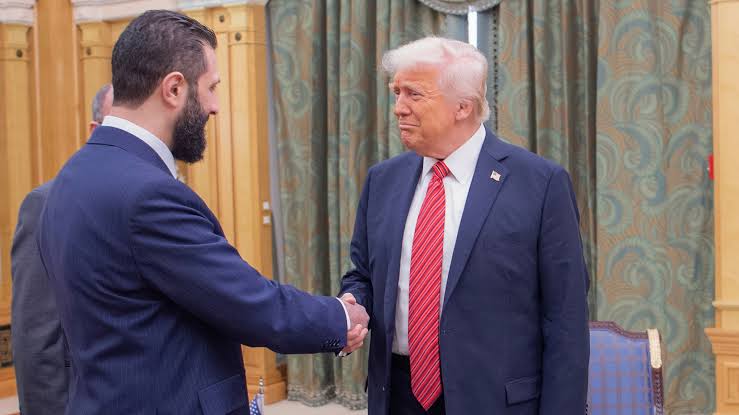Just months ago, it would have been unimaginable. But on Wednesday, in a gilded room in Riyadh, Donald Trump shook hands with Ahmed al-Sharaa, the man now leading Syria after the fall of the Assad regime. The meeting, though brief—just 37 minutes—could mark a turning point for a nation ravaged by over a decade of war.
The encounter, arranged with the backing of Saudi Crown Prince Mohammed bin Salman and joined virtually by Turkey’s President Recep Tayyip Erdogan, was enough to spur Trump to publicly reconsider the United States’ hardline stance on Syria.
“I think he’s got the potential,” Trump said of Sharaa, a former militant whose past ties to al-Qaeda once earned him a $10 million bounty from the U.S. That bounty was lifted only late last year, highlighting the dramatic shift now underway.
Trump’s comments came shortly after a surprise announcement at a major U.S.-Saudi investment forum, where he revealed plans to lift economic sanctions on Syria—an unexpected reversal that earned him a standing ovation.
Sharaa, once a commander in the group Hayat Tahrir al-Sham, has in recent months been presenting himself in a different light: clean-cut in a Western business suit, projecting unity for all Syrians. Since taking office in December, he’s tried to reframe his image—and Syria’s—on the global stage.
Inside Syria, news of potential sanctions relief has sparked cautious celebration. “It’s a new light at the end of this tunnel,” said Hind Kabawat, minister of social affairs and labour. With poverty now affecting over 90% of Syrians, even the possibility of rejoining the global financial system offers hope.
Lifting sanctions could bring much-needed humanitarian aid and foreign investment. It may even persuade some of the millions of Syrians in exile to consider returning. But experts warn it won’t happen overnight. “Presidential waivers can ease some restrictions quickly,” said Dina Esfandiary of Bloomberg Economics. “But the broader sanctions will take serious effort to unwind.”
Trump, meanwhile, is looking for something in return. He wants Syria to join the Abraham Accords—a regional pact aimed at normalizing ties with Israel. Sharaa, according to reports, has signaled willingness under “the right conditions,” though Israel remains wary. Prime Minister Netanyahu has reportedly urged Trump to keep sanctions in place, citing security concerns over HTS and foreign fighters still active in Syria.
Still, the symbolism of this moment isn’t lost. For millions of Syrians, it’s a glimmer of change after years of war, hardship, and isolation.
Trump called it “a chance at greatness.” For ordinary Syrians, it’s simply a chance at a better life.

